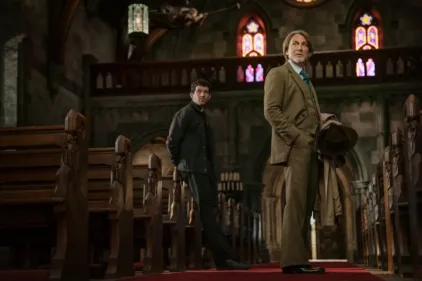Rex Harrison admittedly isn’t as dumpy as Dolittle, perhaps because they weigh the same but the doctor is about a foot shorter. But what difference does that make?
“We could have gone for someone who looked like the book illustrations of Dr. Dolittle,” Christopher Lofting allowed, “but maybe that would not have been the best idea. We wanted someone who had the feel of Dolittle; a combination of authority and gentleness, the kind of guy who could talk to animals and be convincing.”
Lofting was in town to talk about the spectacular $18,000,000 movie version of “Dr. Dolittle,” which opens at the Michael Todd Theater Dec. 20.
His father, Hugh, wrote the original Dolittle stories as letters from the front lines during World War I.
Christopher wasn’t around then. The letters went to his older half brother and half sister, Colin and Elizabeth, whose mother died when they were young. Hugh Lofting’s second wife died three weeks after their marriage and Christopher was the child of a third marriage in 1935.
“By then,” he said, “my father resembled Dr. Dolittle, his creation, in many respects. Of course, he always denied that he identified with Dolittle in the slightest. But once he sent my mother driving 100 miles to find a fertile egg for our pet canary. The poor canary had been sitting on her egg for weeks without any luck. So mother brought back an egg from a nesting ground.
“Father had given her specific instructions about what kind of egg to look for. It was supposed to be a small finch. But the egg turned out to belong to a thrush, and in about a month the baby was about twice the size of the mother.
“Still, they got alone fine the mother was happy and the baby thought it was a canary. Only my father could have done something like that; he had an animal green thumb.”
Lofting said his father’s original Dolittle letters from the front lines were a protest of sorts against the war.
“He was appalled by the suffering of animals in wartime,” Christopher said.
“There were thousands of cavalry horses in the war, and also farm animals and pets who got caught in the crossfire.
“My father invented Dolittle, the man who could speak with animals and cure them, as a superhero who could do things he couldn’t do.”
Lofting, on leave from a post as science writer at Life magazine, controls the rights to his father’s creation. He said it took so long to bring Dr. Dolittle to the screen because of the difficulty in presenting the animals realistically and, “quite frankly,” because enough money wasn’t previously offered. Walt Disney wanted to do a full-length animated cartoon in 1940, Lofting said, but only offered $7,500 for the rights to the books.
“Animation would have offered an ideal solution to the problem of depicting highly intelligent, talking animals,” he said, “but we think the effect is even better with living actors and animals. Kids will know they’re real, and that will be the secret of the movie.”











